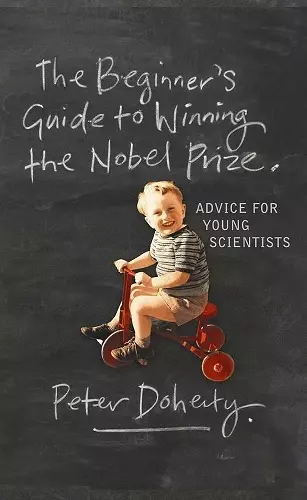The Beginner's Guide to Winning the Nobel Prize
Advice for Young Scientists
Format:Paperback
Publisher:Columbia University Press
Published:30th May '08
Currently unavailable, and unfortunately no date known when it will be back

Peter Doherty recounts his unlikely path to becoming a Nobel Laureate, revealing how his nonconformist upbringing, sense of being an outsider, and search for a different perspective have shaped his life and work. Beginning with his humble origins in Australia, Doherty shares his early interests and describes his award-winning, influential work with Rolf Zinkernagel on T-cells and the nature of immune defense. In prose that is amusing and astute, Doherty offers a rare insider's look at the realities of being a research scientist. He lucidly explains his own scientific work and the selection, funding, and organization of research projects; the major problems science hopes to solve; and the rewards of a career in scientific research. For Doherty, science plays an important role in improving the world, and he argues that scientists need to do a better job of making their work more accessible to the public. He concludes with tips on how to win a Nobel Prize, including advice on being persistent, generous, and culturally aware.
Useful for those interested in a career in science, the author recounts his unlikely path to becoming a Nobel Laureate. Beginning with his humble origins in Australia, he tells how he developed an interest in immunology and describes his award-winning, influential work with Rolf Zinkernagel on T-cells and the nature of immune defense.In The Beginner's Guide to Winning the Nobel Prize, Doherty recounts his unlikely path to becoming a Nobel Laureate. Beginning with his humble origins in Australia, he tells how he developed an interest in immunology and describes his award-winning, influential work with Rolf Zinkernagel on T-cells and the nature of immune defense. In prose that is at turns amusing and astute, Doherty reveals how his nonconformist upbringing, sense of being an outsider, and search for different perspectives have shaped his life and work. Doherty offers a rare, insider's look at the realities of being a research scientist. He lucidly explains his own scientific work and how research projects are selected, funded, and organized; the major problems science is trying to solve; and the rewards and pitfalls of a career in scientific research. For Doherty, science still plays an important role in improving the world, and he argues that scientists need to do a better job of making their work more accessible to the public. Throughout the book, Doherty explores the stories of past Nobel winners and considers some of the crucial scientific debates of our time, including the safety of genetically modified foods and the tensions between science and religion. He concludes with some "tips" on how to win a Nobel Prize, including advice on being persistent, generous, and culturally aware, and he stresses the value of evidence. The Beginner's Guide to Winning the Noble Prize is essential reading for anyone interested in a career in science.
A highly readable introduction to the modern world of scientific research. -- Mary Powers Commercialappeal.com Important to any aspiring scientist. Bookwatch A charmingly homely account of his own unlikely path toward this pinnacle. -- Margaret Wertheim Los Angeles Times Doherty opens the vault to the world of science. Nature The Beginner's Guide to Winning the Nobel Prize is an interesting and useful read for up-and-coming scientists. Journal of the American Medical Association This extended and amusing memoir does show how the path to a Nobel can be rocky and winding. -- Jeff Bairstow Laser Focus World
ISBN: 9780231138970
Dimensions: unknown
Weight: unknown
320 pages